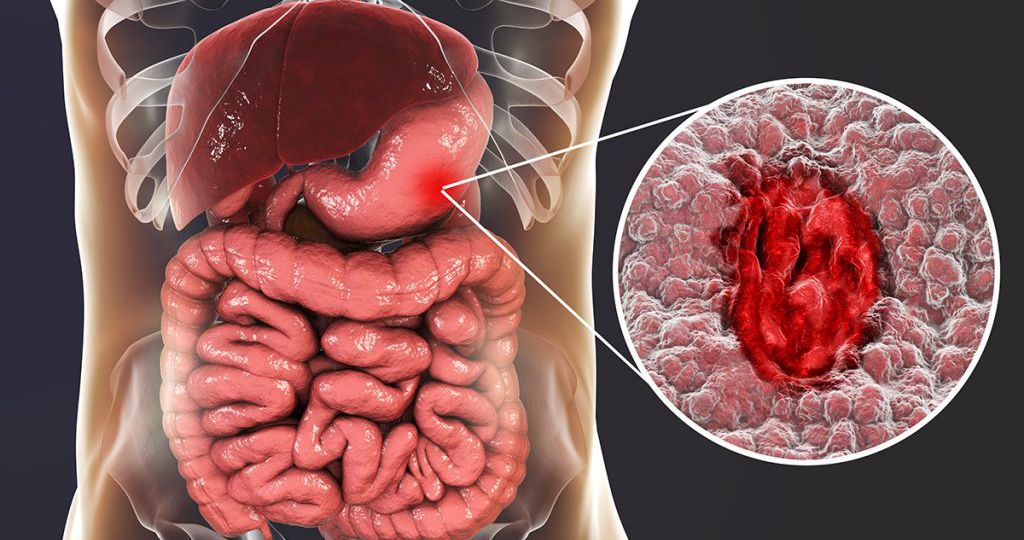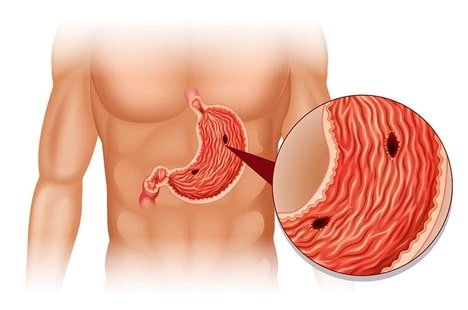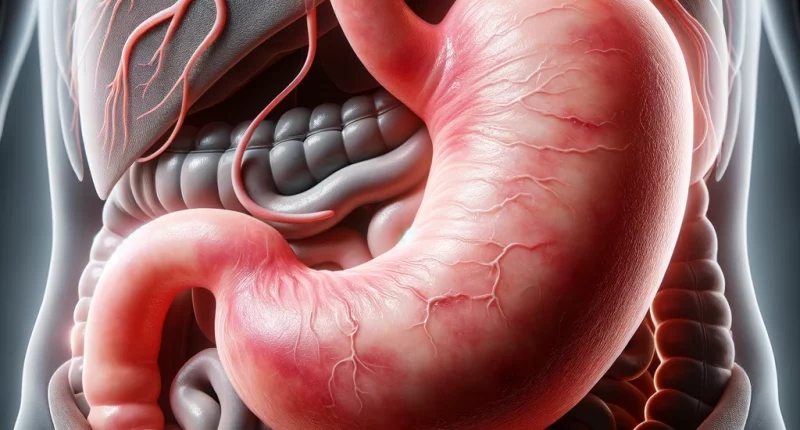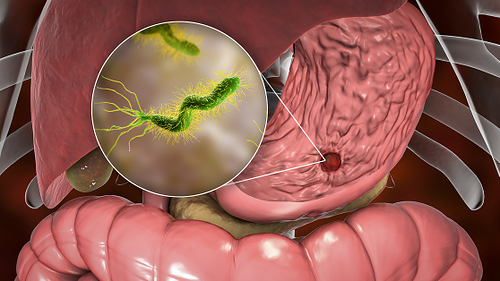
1. Understanding Stomach Ulcers and Their Causes
Before delving into how to manage daily life with a stomach ulcer, it’s essential to understand the condition itself. A stomach ulcer is a break in the mucous lining of the stomach, usually caused by a bacterial infection (Helicobacter pylori) or the long-term use of nonsteroidal anti-inflammatory drugs (NSAIDs). Ulcers can lead to symptoms such as abdominal pain, nausea, bloating, and indigestion. Factors such as diet, stress, and smoking can exacerbate these symptoms and hinder recovery.
Key Causes of Stomach Ulcers:

- H. pylori bacterial infection
- Long-term use of NSAIDs (like aspirin or ibuprofen)
- Excessive alcohol consumption
- Smoking
- Stress
- Poor dietary habits (e.g., excessive caffeine, spicy or acidic foods)
2. Importance of Diet in Managing Stomach Ulcers
Diet plays a pivotal role in the management of stomach ulcers. While certain foods can irritate the stomach lining and worsen symptoms, others can soothe and promote healing. For those with stomach ulcers, following a well-balanced diet that avoids irritating foods and includes healing, anti-inflammatory options is critical.
Foods to Avoid:
- Spicy foods: Spices such as chili can increase stomach acid production, which can irritate ulcer sites.
- Acidic foods and drinks: Citrus fruits, tomatoes, and caffeinated beverages can trigger or worsen symptoms.
- Caffeinated beverages: Coffee and sodas can increase acid secretion and irritate the ulcer.
- Alcohol: Alcohol not only increases stomach acid production but also weakens the mucosal lining of the stomach.
- Fatty or fried foods: High-fat foods are slow to digest and can cause bloating and discomfort, exacerbating ulcer symptoms.
Recommended Foods:
- Fiber-rich foods: Whole grains, vegetables, and fruits (except citrus) help reduce acid production and promote healing.
- Probiotics: Yogurt and fermented foods can help restore healthy bacteria in the gut and support digestion.
- Lean proteins: Chicken, turkey, tofu, and fish are good sources of protein that won’t irritate the stomach lining.
- Alkaline foods: Foods that can neutralize stomach acid, such as bananas and melons, are beneficial for ulcer patients.
- Herbal teas: Non-caffeinated teas like chamomile or ginger tea can soothe the stomach and reduce inflammation.
3. The Role of Small, Frequent Meals
Eating small, frequent meals instead of large meals can help reduce stomach acid production and ease digestive stress. Large meals put pressure on the stomach and increase acid production, worsening ulcer symptoms. By eating smaller portions, patients can maintain consistent energy levels throughout the day while avoiding discomfort.

Meal Tips for Stomach Ulcer Patients:
- Aim to eat five to six small meals per day, spaced out evenly.
- Include a balance of protein, healthy fats, and fiber in each meal.
- Avoid eating right before bed to prevent nighttime acid reflux and heartburn.
4. The Impact of Stress on Stomach Ulcers
Stress is often cited as a contributing factor to the development and exacerbation of stomach ulcers. While stress alone does not cause ulcers, it can worsen symptoms and make healing more difficult. Stress can increase stomach acid production and interfere with the body’s ability to repair the stomach lining.
How Stress Affects Ulcers:
- Increased acid production: Stress triggers the body’s “fight or flight” response, leading to the production of more stomach acid, which can aggravate the ulcer.
- Delayed healing: Chronic stress can impair the body’s ability to heal, prolonging the recovery process for ulcer patients.
Stress Management Tips:
- Meditation and mindfulness: Practicing relaxation techniques can significantly reduce stress levels and support the healing process.
- Physical activity: Regular exercise, such as walking or yoga, can help relieve stress and improve overall health.
- Adequate sleep: Prioritizing sleep allows the body to rest and repair, promoting healing and reducing the negative effects of stress.
5. The Importance of Quitting Smoking
Smoking is a significant risk factor for the development and exacerbation of stomach ulcers. It can delay healing and increase the likelihood of ulcer complications, such as bleeding or perforation. Smoking decreases blood flow to the stomach lining, impairing its ability to repair itself.

Why Smoking Worsens Ulcers:
- Increased acid production: Smoking stimulates the production of stomach acid, exacerbating symptoms.
- Impaired healing: Smoking reduces oxygen levels in the blood, slowing down the healing process.
- Higher risk of complications: Smokers are more likely to develop ulcers and experience severe complications, including bleeding and perforation.
Tips for Quitting Smoking:
- Seek support from a healthcare provider or counselor for personalized strategies.
- Consider nicotine replacement therapies, such as patches or gum, to manage cravings.
- Engage in healthy activities, such as exercise or meditation, to distract from the urge to smoke.
6. Medication Management for Stomach Ulcers
Proper medication management is vital for people with stomach ulcers. Ulcer medications typically include proton pump inhibitors (PPIs), H2 blockers, and antibiotics (if the ulcer is caused by H. pylori). These medications reduce stomach acid and promote healing of the ulcer.
Types of Medications:
- Proton Pump Inhibitors (PPIs): PPIs, such as omeprazole, reduce the amount of stomach acid produced, promoting ulcer healing.
- H2-receptor antagonists: These drugs, like ranitidine, also reduce stomach acid but are generally less potent than PPIs.
- Antibiotics: If an H. pylori infection is present, antibiotics like amoxicillin or clarithromycin are prescribed to eradicate the bacteria.
Key Medication Tips:
- Take medications as prescribed by your healthcare provider and follow up regularly.
- Do not discontinue medications prematurely, even if symptoms improve, as the ulcer may still need time to heal.
- Be mindful of any side effects of medications, such as nausea or dizziness, and report them to your doctor.
7. Regular Monitoring and Medical Checkups
Regular checkups with a healthcare provider are essential for people with stomach ulcers. Ongoing monitoring ensures that the ulcer is healing properly and that any potential complications, such as bleeding or perforation, are detected early. Patients should undergo routine endoscopies if necessary, especially if they have a history of severe ulcers or complications.
Importance of Regular Checkups:
- Monitor the progress of healing and check for any recurrence of ulcers.
- Assess for potential complications like bleeding, which may require additional treatment.
- Adjust medications or dietary recommendations based on progress.
8. Long-Term Management and Lifestyle Adaptations
After the initial treatment and healing of the ulcer, long-term management is necessary to prevent recurrence and ensure ongoing stomach health. Maintaining healthy lifestyle habits, including a balanced diet, stress management, and medication adherence, is critical for managing ulcers over time.
Long-Term Tips for Ulcer Prevention:
- Maintain a healthy diet rich in fiber, lean proteins, and antioxidants.
- Practice stress management techniques, such as yoga or mindfulness, to reduce stress levels.
- Continue taking medications as directed, especially if prone to recurrence.
